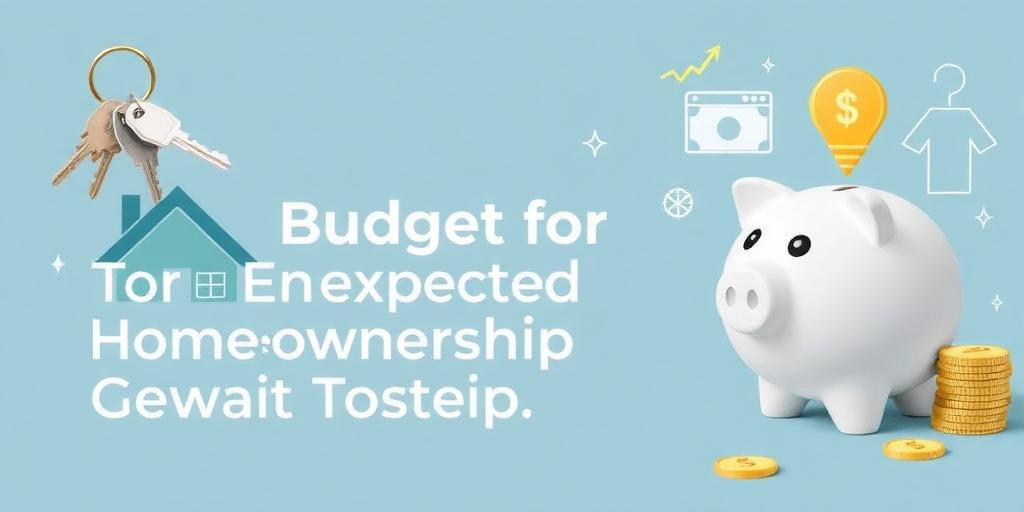How to Budget for Unexpected Homeownership Costs
Homeownership: the quintessential American dream. Yet, beyond the white picket fence lies a realm of potential financial surprises. While you meticulously budget for mortgage payments, property taxes, and insurance, unexpected costs can emerge from the shadows, threatening to derail your financial stability. This authoritative guide will equip you with the knowledge and strategies to budget effectively for these unforeseen expenses, ensuring you’re prepared for whatever homeownership throws your way.
Why Unexpected Costs Arise
Unlike predictable monthly bills, homeownership comes with the inherent risk of irregular and often substantial expenses. These can stem from:
- Aging Infrastructure: Older homes are particularly susceptible to issues with plumbing, electrical systems, and roofing.
- Natural Disasters: Depending on your location, you might face damage from storms, floods, earthquakes, or wildfires.
- Appliance Failures: Refrigerators, washing machines, and HVAC systems can break down unexpectedly, requiring costly repairs or replacements.
- Hidden Problems: Issues like mold, asbestos, or structural damage may not be apparent during a home inspection but can surface later.
Building Your Emergency Fund
The cornerstone of managing unexpected costs is a dedicated emergency fund. Financial experts recommend setting aside 1% to 3% of your home's value annually for these expenses. For example, on a $300,000 home, this translates to $3,000 to $9,000 per year.
Here’s how to build and manage your emergency fund:
- Start Small: Begin by setting a modest savings goal and gradually increase it over time.
- Automate Savings: Set up automatic transfers from your checking account to a high-yield savings account.
- Resist Temptation: Treat this fund as a last resort, only to be used for genuine home-related emergencies.
- Replenish After Use: If you tap into the fund, make a plan to replenish it as quickly as possible.
Creating a Home Maintenance Budget
Beyond the emergency fund, proactive maintenance can prevent minor issues from escalating into major, costly problems. Allocate a portion of your budget to regular home maintenance tasks:
- Annual HVAC Servicing: Schedule a yearly check-up to ensure your heating and cooling systems are running efficiently.
- Gutter Cleaning: Clean gutters regularly to prevent water damage to your roof and foundation.
- Plumbing Inspections: Have a plumber inspect your pipes and fixtures for leaks or potential problems.
- Roof Inspections: Check your roof for damaged or missing shingles.
Strategic Savings and Investments
Consider these strategies to further bolster your financial preparedness:
- Home Warranty: A home warranty can cover the cost of repairing or replacing appliances and systems. However, carefully review the terms and conditions, as coverage may be limited.
- Line of Credit: A home equity line of credit (HELOC) can provide access to funds in an emergency. Be mindful of interest rates and repayment terms.
- Tax-Advantaged Accounts: Explore using health savings accounts (HSAs) or other tax-advantaged accounts for eligible home-related expenses.
Reviewing Insurance Coverage
Your homeowner's insurance policy is a critical safety net. Understand what your policy covers and consider supplemental coverage for specific risks:
- Flood Insurance: If you live in a flood-prone area, flood insurance is essential.
- Earthquake Insurance: In earthquake-prone regions, consider earthquake coverage.
- Umbrella Insurance: An umbrella policy provides additional liability coverage beyond your homeowner's policy.
Long-Term Planning
Planning for the long term can help you anticipate and mitigate future expenses:
- Major Renovations: If you’re planning a major renovation, factor in potential cost overruns.
- Energy Efficiency Upgrades: Investing in energy-efficient appliances and insulation can reduce your utility bills and increase your home's value.
- Future Repairs: As your home ages, anticipate the need for major repairs, such as roof replacement or foundation work.
Conclusion
Budgeting for unexpected homeownership costs is not merely a financial exercise; it's an act of responsible home stewardship. By building an emergency fund, creating a maintenance budget, strategically saving, and understanding your insurance coverage, you can navigate the unpredictable waters of homeownership with confidence. This proactive approach will safeguard your financial well-being and ensure that your dream home remains a source of joy, not stress.









